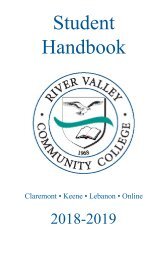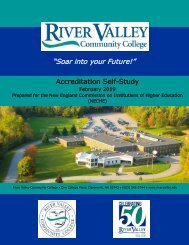You also want an ePaper? Increase the reach of your titles
YUMPU automatically turns print PDFs into web optimized ePapers that Google loves.
institution, the general education requirements provide a foundational basis to prepare<br />
them for more advanced studies.<br />
The Major or Concentration<br />
Each program follows a program map which builds from early levels of knowledge to more<br />
advanced levels as the student progresses from 100 to 200 level courses. Each program<br />
has written goals and objectives. Each course in the program also identifies specific goals<br />
and skills that will be obtained upon completion.<br />
Program goals and outcomes are informed by accreditation standards, industry standards,<br />
employment requirements, or transfer expectations. Many technical programs, including<br />
certificate programs, use input from advisory boards and/or accreditation standards to<br />
guide the knowledge base that the students must meet.<br />
Appraisal of the Major or Concentration<br />
Program Directors have autonomy in development of the curriculum and how the program<br />
specific coursework will be implemented. However, development of the coursework which<br />
supports the curriculum of the individual program is created with the same framework as<br />
the general education requirements ensuring that coursework is appropriate for the<br />
student’s level of knowledge while progressing the student from simple knowledge to<br />
complex mastery. Content of the program specific courses is informed in many of the<br />
allied health, health science, and nursing programs by national accreditation standards.<br />
Additional input on curricular expectations of programs comes from advisory boards and<br />
industry standards. Program Directors regularly evaluate their courses for relevancy to<br />
ensure graduates are prepared for their chosen fields. The Curriculum Team requires<br />
courses be reviewed every five years but most Program Directors do this on a more<br />
frequent basis.<br />
Integrity in the Award of Academic Credit<br />
Academic Credit & Course Objectives<br />
River Valley awards two levels of credentials: the certificate and the associate degree. All<br />
credentials meet standards of the CCSNH Board of Trustee Policy 620.02 regarding<br />
requirements for graduation. All associate degrees must contain a minimum of sixty<br />
credits with at least 15 credits taken directly at <strong>RVCC</strong> (not transferred in) including a<br />
minimum of 8 credits in the major or specific field of study. Depending on the degree<br />
being awarded, either the Associate in Science or the Associate in Arts, there are slight<br />
differences in the core. All students in either track must earn a minimum of 20 credits of<br />
liberal arts courses including College Composition, Math, Humanities/Fine Arts/Language,<br />
Science, and a Social Science. The Associate of Arts degree requires additional credits in<br />
Literature/Composition/Communications and at least one Lab Science. The remaining<br />
credits must include 20-24 (for an A.A.) or 30 (for an A.S.) program specific credits. In<br />
the case of the A.A. in Liberal Arts, the additional credits must include 12-15 additional<br />
Liberal Arts electives from the core listed plus 9 credits of open electives. Certificate<br />
programs at <strong>RVCC</strong> also follow the BoT policy and must be at least 6 credits in length with<br />
all courses designed to meet competencies in an occupational field.<br />
44 | P a g e





